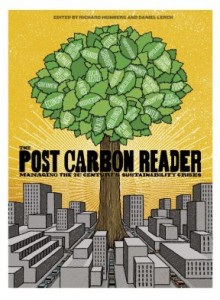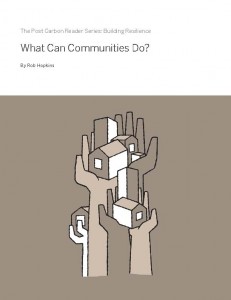15 Sep 2010
What Can Communities Do? My Contribution to the Post Carbon Reader
 My section of Post Carbon Institute’s ‘Post Carbon Reader: managing the 21st century’s sustainability crises’, due out in October, has just been published online. You can download the pdf of my part here, and can see all the previous pdfs that have been published so far here. For a sense of the final book, you can see the contents page here. It’s going to be a great book. Here is an short extract of my piece:
My section of Post Carbon Institute’s ‘Post Carbon Reader: managing the 21st century’s sustainability crises’, due out in October, has just been published online. You can download the pdf of my part here, and can see all the previous pdfs that have been published so far here. For a sense of the final book, you can see the contents page here. It’s going to be a great book. Here is an short extract of my piece:  Community matters when we are looking for responses to peak oil and climate change because of the power that emerges from working together and creating meaningful change through shared action. In a world where social capital and a sense of connection to community are in decline, it is the taking of practical action that enables us to rediscover meaningfulness and community.
Community matters when we are looking for responses to peak oil and climate change because of the power that emerges from working together and creating meaningful change through shared action. In a world where social capital and a sense of connection to community are in decline, it is the taking of practical action that enables us to rediscover meaningfulness and community.
It is my observation, through seeing what groups inspired by Transition have done, that happiness and fulfillment are achieved through meaningful activity, and meaningful activity needs to happen with other people. If we see climate change and peak oil as purely environmental and energy problems that someone else will fix, we give away our potential to create change, and we close ourselves away and feel powerless–and the last thing we need at this point in history is people feeling powerless.
…Given the scale of the challenges humanity faces in the early-twenty-first century, already outlined in great detail in earlier sections of this book, it is clear that a range of responses is required. Government is part of the solution, but it tends to be reactive rather than proactive.
Local government is often so focused on meeting immediate needs with limited resources that it doesn’t feel it can be imaginative or take much initiative. Local citizens often feel disempowered after years of being ignored in the decisions made about their community.
However, any sufficient response to these challenges requires all of the levels of response working together, driven by the twin objectives of massively reducing carbon emissions and building resilience. The Transition movement embodies this approach with an attitude that might be summarized this way: “If we try and do it on our own it will be too little, if we wait for government to do it it will be too late, but if we can gather together those around us—our street, our neighborhood, our community—it might just be enough, and it might just be in time.”
John Mason
17 Sep 12:28pm
Good read Rob. I would just like to take issue with one point you made:
“It is my observation, through seeing what groups
inspired by Transition have done, that happiness and fulfillment are achieved though meaningful activity, and meaningful activity needs to happen with other people.”
Indeed it does, but it is also critical to note that it has to happen on an individual basis too, in two ways:
Firstly, of course, there needs to be the process that leads to personal acceptance of the situation into which we are heading, something that is clearly much easier for some people than others, dependent on background/social philosophy.
Secondly, do not forget the empowerment and fulfillment that comes from taking on a challenge as an individual. This – the personal goal – is a core part of the human psyche. It is quite different from competitiveness – another core part of the human psyche – in that it is not about “beating” any other competitors.
From personal experience, the personal goal is a journey of wonder just as much as creating community-based projects. Resilience is core to the Transition Movement and I would add in personal, as well as community, in the definition. Both are important and fun to bring about. I should add that on a personal basis I am learning a lot about personal resilience this past few weeks, as I have this past 6 weeks been desperately seeking work and having to find nearly twenty quid out of my JSA to cover a housing benefit shortfall, leaving 45 quid a week to cover all other living costs. It is do-able – you simply stop being a consumer! – but it takes a lot of thought. All I can say is thank heavens I am in year 2 of learning to grow veg, so am surrounded with good fresh organic produce! And I wouldn’t have taken on that challenge had I not found out about Transition!
However, if George Osborne should like to try this “lifestyle choice” for a few weeks, I’ll go and run the economy as a swap 🙂
Cheers – John